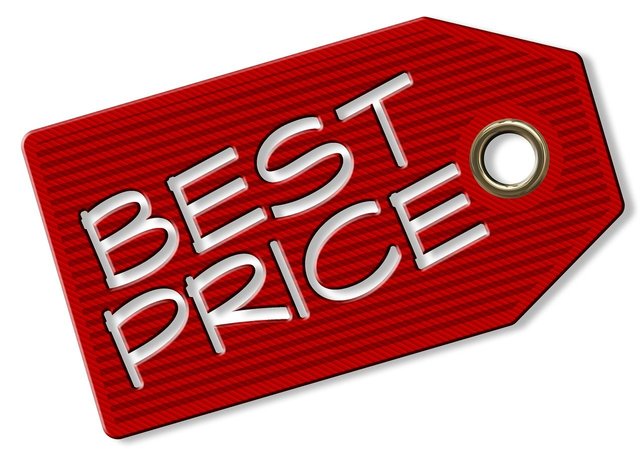SLC | S21W5 | Costs for Entrepreneurs - Pricing Strategies.
Introduction |
|---|
In business, pricing is one key factor that determines if your product is able to attract customers, remain competitive and stay profitable. I will be pointing out some importance of pricing process, aspects to Consider When Setting a Product or Service Price, with some examples to pricing method.
Before going further, let me invite @lovelystar @ochelebe and @bossj23 to participate in this challenge.
What is the importance of the pricing process? |
|---|

- Price play a major role in how you strategically place yourself among your fellow competitors in that same line of business. Setting a competitive price attracts lots of customers to your business. While a higher price will bring just few customers but loyal ones. It all depends on your business goals.
- At the back of every business person’s mind is to make profit. But in other to make profit, you must ensure you don’t price your products too high because it will chase away your potential customers and also you don’t sell too low because your business won’t be able to stay afloat by covering cost or make profit. So, it’s important you get your prices right to ensure the business can cover cost and still make a good profit.
- With pricing, is easier to position your business in the market. If you want to be known as premium brands like Gucci and Luis Vuitton you set high prices for your products. Such prices attract the “high and mighty” into your business but if you have the general public in mind, you set a low price for your product.
- How your product is perceived by customers is determined by the price attached to it. If you give your product a high price, psychologically, customers believes that the product is of high quality compared to the once with low price. So, business should know that the right price shapes how customers perceive the product.
Aspects to Consider When Setting a Product or Service Price |
|---|

- It’s important to understand the cost of production of any goods or services, which includes rent, salaries, raw materials and labor. The reason for this is because, whenever you are setting prices for the products. It must cover production costs and still leave room for profit.
- If you run a business that has high demand from customers, you can put your product at a higher price. For instance, in Nigeria today, we have only one refinery owned by dangote. Since his business has a monopolistic nature, he can sell at a very high price because we all need that refinery. On the other hand, if your product has low demand, the best thing you can do is to reduce your price, to attract more customers.
- Before even entering a market, your competitors are one of the things you take into consideration especially the ones that offers same product or alternative to what you sell. Once you identify this, it is in your best interest you investigate what your competitors are selling that same product, so that you don’t chase them away to your competitors with high prices and also don’t sell too low, so they won’t see your product as low quality.
- External factors is another thing to consider when setting a price for your product. Things like market trends, economic conditions, seasonality affects how much people are willing to pay for your product or service. For instance, we’re in the Christmas season, so customers are expecting rise in price of products.
Examples of Businesses and Pricing Methods |
|---|
- Cost-Based Pricing:
Let’s say you run a small fashion business like me from home, you will be calculating how much it will take to produce a dozen of shirt for a boutique that placed an order, including the materials (like fabrics, buttons, collar gum etc), your labour and any overhead cost (like utility bills ). Once you’re done calculating this and getting the cost, then you can add your little profit on top.
Reasons:as a small fashion designer, you need to ensure that whatever price you’re giving your clients covers both your costs and also has profit on it.
- Demand-Based Pricing:
One example I will like to use in Nigeria is fuel prices. Whenever the demand of fuel is so high especially during scarcity period, you will see filling stations, increasing their price so high. Even black market sellers take advantage of those who are not patient enough to wait on the very long queue in the filling station by selling two times the price of what the station is offering. But once there is surplus and low demand, the price will come back to normal. You will hardly see anyone patronizing any black market sellers for fuel.
Reasons: business can charge at higher prices, when their is a high demand for their products in order to maximize profit and can make it attractive to customers by bringing the price down when there is low demand.
- Competitive Pricing:

In retail shops, for example in a provision store. Your price of your provisions is determined by the price of other competitors. The best you can do is to slightly increase it or slightly reduce it by maybe $2.
Reasons for this is that it keeps the business competitive in market. You can’t Just wake up one day and make the price of your product very high, when they have a million and one business selling same product at a cheaper price. So, it’s important you track competitors prices and adjust accordingly.
Step 1:
We start by calculating the desired profit.
Steemian company is expecting a 20% return after investing 130,000 in equipment
Desired profit= 130,000 x 20/100 = 26,000
Step 2
Calculate profit per unit.
Steemians company projected sales for next year is 21,000 units.
= 26,000 (desired profit) / 21,000 (projected sales ) = 1.24.
Step 3
Calculate the profit percentage on the production cost.
The total production cost per unit is
25,
Therefore,
profit percentage is: 1.24 (profit per unit) / 25 (production cost per unit) x 100 = 4.96%
So, the profit percentage that should be added to the unit cost is 4.96%.
To get the internal market price, we add the profit to the production cost.
Therefore,
Internal market prices = production costs (25)+ profit per unit (1.24)= 26.24
Internal mkt price= 26.24
From what we’ve learnt from this course, i will say it is possible to compete because the difference between the competitors price which is $28 and the internal market price which is $26.26 is just $1.76.
There is no much difference. In fact customers will be more attracted to your goods because they stand to save $1.76. That’s an advantage.
Greetings @sbamsoneu
1.- You have shared the importance of setting prices, it is important to be clear that price is not directly related to quality, however, it can have an impact on the mentality of customers.
2.- You have mentioned the aspects to consider when setting prices, highlighting the analysis of production costs and demand as the factors with the greatest impact.
3.- You have presented valid business examples, according to the pricing method.
4.- You have developed the proposed exercise in an acceptable manner.
Thanks for joining the contest